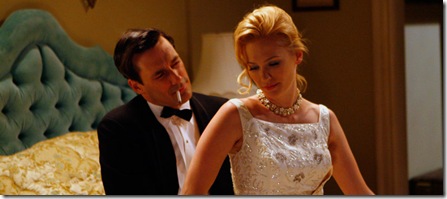
The second season of Mad Men begins tonight on AMC. If you haven’t seen it, then I highly recommend that you do and that you also rent the first season on DVD or through your favorite peer-to-peer network and catch up on this beautiful piece of television.
Mad Men is about Madison Avenue advertising executives in the early 1960’s, when the 60’s looked like the 50’s in the same way that what we think of as the 60’s is really the 70’s. It is a world in which men smoke and drink, swagger and get things done. They were veterans of either Korea or WWII, and knew how to accomplish great things. In the process they created a wonderland that was America at its height, which had within it the seeds of America’s decline. In Mad Men, we are afforded the opportunity to see it all.
There is something peculiar about enjoying Mad Men. The sleezy misogyny and petty racism of the period is laid out for us to see. Yet despite this, there is a sense that men were really men back then — and certainly not Robert Bly-reading tree hugging faux-woodsmen trying to recapture something we didn’t realized we had lost. They are the real deal — a generation that gave us James Bond as well as a militant communist-hating wing of the Democratic party. Damn those were the days.
It is, in a sense, an antidote to The Office, the satirical show about office work that makes us feel like we all suck and it’s alright — a show about spin going out of control to the point that the criteria for success and failure are utterly open to interpretation.
In Mad Men, there is no ambiguity about what success and failure entail. Success means a well-padded expense account, an attractive secretary and a corner office with a bar built into the wall. Failure means being denied these things.
And yet the world of the mad men have led us to the place where we are now. They may have been men of character in their own way, but they created a world in which spin matters more than character, and one manages not by example but by personality tests and manipulation. Perhaps the world of the mad men was no less corrupt, but they attempted to hide it and build something more beautiful, while we tend to cover it up with self-effacing humor ala John Stewart, Stephen Colbert and Conan O’Brien, our contemporary zeitgeist-setters whose humor shares the common conceit that they know they are privileged and have no intention of giving it up, but they are more than willing to feel bad about it.
In Mad Men, no one seems to have regrets, and a bold face is the essence of a moral stance. The warts are all there to see, and they are ugly indeed. But at the same time there is a sense of style and elegance that we no longer find in the modern office, and it draws the viewer like a slow seduction into something we know is not good for us.

In Mad Men, there is no ambiguity about what success and failure entail.